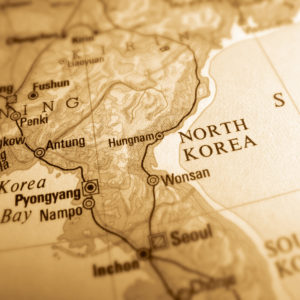The summit between South Korea’s President Moon Jae-in and North Korean leader Kim Jong-un sets the stage for a battle within the Trump administration over how to deal with the urgent issue of denuclearization.
Assuming Trump does make good on his commitment to meet Kim in May or June, he then faces a severe disagreement with Kim regarding the meaning of “denuclearization.” No way is Kim expected to agree to giving up his nuclear arsenal.
That much seemed inescapable after a day of glittery showmanship surrounding the Moon-Kim summit at the truce village of Panmunjom. Amid all the ceremony and pledges of peace, they carefully avoided the basic issue of North Korea getting rid of its nuclear program and the missiles needed to send them to distant targets. It was only in the final paragraph of their “Panmunjom Declaration for Peace, Prosperity and Unification of the Korean Peninsula” that they mentioned denuclearization at all.
And they did so in a way that suggested it was not really North Korea’s problem. Far from blaming the North or hinting that Kim needed to abandon the program, the declaration said merely that “the measures being initiated by North Korea are very meaningful and crucial for the denuclearization of the Korean Peninsula.”
The White House and State Department officially, politely, praised the results of the summit, but the diplomatic language masked the concern that Kim did absolutely nothing about meeting demands that he abandon the program in which he has so far ordered four nuclear tests, most recently the underground explosion of a hydrogen bomb in September. His late father, Kim Jong-Il, had ordered two nuclear tests before dying in December 2011, yielding power to Kim Jong-un.
Nor was there the slightest hint of the need for inspectors to see whatever Kim is doing about complying with demands by South Korea and the U.S., and just about every other major country, that he live up to his claim to be focusing on his country’s decrepit economy rather than wasting dwindling resources on nukes and missiles.
The summit, however, was so skillfully enacted and so well received in Korea and abroad that Trump undoubtedly will want to keep his commitment to see Kim Jong-un and talk over personally the hardships that confront him if he doesn’t seriously yield to demands to give up his precious nukes and missiles.
Trump’s hard-line national security adviser, John Bolton is sure to be advising Trump that actually the North-South summit between Kim and Moon accomplished little if anything beyond raising confidence in the North Korean leader’s desire for peace and friendship. It’s not likely, however, that Bolton will manage to persuade Trump not to fulfill his desire to meet Kim and see if he can come to terms with him, using the powers of negotiation and persuasion that he wrote about in his book, “The Art of the Deal.”
The problem, analysts note, is that moves toward friendship between the U.S. and North Korea will go nowhere as long as Kim is convinced he can do whatever he wants, sure that South Korea and the U.S. will do nothing to stop him until he is forced to relent.
In fact, it’s widely believed, as Trump has claimed, that Kim had plotted his charm offensive as early as January when he announced his intention to send a contingent of athletes, cheerleaders and taekwondo wrestlers to the Winter Olympics in PyeongChang. He then sent his younger sister, Kim Yo-jong, to the opening ceremony and had her at a dinner in the Blue House present Moon with a letter inviting him to a summit.
The charm offensive began to come to a climax with Kim’s meeting with Moon at Panmunjom on the North-South line where the Korean War armistice was signed nearly 70 years ago. In pursuit of his oft-stated goal of reconciliation and dialog with North Korea, Moon showed he wanted nothing more than to smooth the way to a great personal relationship with the North Korean leader.
Although Moon himself said denuclearization of the North remained a top priority, he did not want to let it intrude upon his relationship with Kim and those around him. There was no sign during the long day of summitry that Moon ever specifically demanded that he order denuclearization.
Trump himself, in pubic, appeared pleased with the summit, tweeting, “After a furious year of missile launches and Nuclear testing, a historic meeting between North and South Korea is now taking place.” He added, “Good things are happening” but somewhat qualified that observation by saying he would “seek to denuclearize the North Korean area and the entire Korean Peninsula” when he meets Kim as planned in several weeks.
The inference of that remark seemed to be, when Trump sits down with Kim, he will tell him that he needs not only to freeze his nuclear program but also to shut down his nuclear facilities and destroy his warheads. Kim has said that he will not order any more nuclear and missile and was closing the nuclear test site.
In fact, the site was rendered unusable by the most recent nuclear test in September, the explosion of a hydrogen bomb many times more powerful than the warheads detonated earlier. The blast sent tremors through a wide region, destroying buildings and killing people at the test site and in nearby villages.

